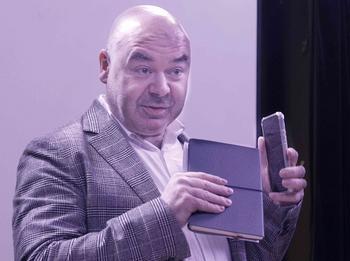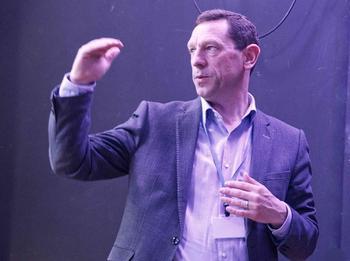Don’t let your blower make you a sucker
Tim Dawson, NEC freelance rep, reports on NUJ Dublin’s Freelance Forum with speakers advising on keeping cybersafe, pitching stories, reporting abuse and writing a newsletter.

Fergal Crehan dispenses simple advice to journalists when they go out to work. “Don’t take your phone,” he says.
Smart phones are sieves from which data flows, compromising sources, jeopardising privacy and endangering their users, he warns. Standard fare from a tin-foil-hat-sporting conspiracy theorist? Crehan, however, is an eminent barrister, who specialises in data security, and who for many years worked for the mobile phone industry.
He was speaking to the Freelance Forum, a regular, day-long event organised by the NUJ’s Dublin Freelance Branch. His guidance could not have been blunter.
Nor was he sparing of other everyday working norms. “Don’t use Gmail,” he said. “Secure services such as Protonmail are far safer. Use pseudonyms if you are programming numbers into a burner phone. Delete all social media accounts and be particularly wary of online interactions with family and friends – they can reveal critical personal details such as birthdays, anniversaries, previous addresses and the names of parents and pets.”
His most novel advice for secure communications was this: “With critical, confidential contacts, set up a dedicated email account that you both can log into it. When you want to share information, create an email as a draft, that will be there for your correspondent to read and then delete. Information will never pass between accounts and will be close to impossible for anyone to track.”
There was plenty more advice, use VPNs (virtual private networks), TOR (a browser which isolates each website you visit so third-party trackers and ads can't follow you), and old-school trade craft. More than anything, he counselled, embrace paranoia and apply it to all your working methods.
Are attempts to disrupt and undermine journalism so prevalent that such methods are universally necessary, I wondered? The next speaker certainly seemed to think so.

Andrew McLindon is director of communications for Garda Siochána, the Irish police. He serves as co-chair of the Garda’s Media Engagement Group, established in June 2022, after the NUJ and media organisations made the case that attacks on journalists were increasing in intensity and frequency, and were under-reported.
“It became clear to us that we had an inconsistent approach to recording attacks on members of the media,” McLindon said. “I had been a freelance journalist myself, so the issues weren’t new to me, but the prevalence was a surprise.”
After some international research on approaches to safeguarding journalists, a Media Engagement Group (MEG) was established, bringing together leaders from major news platforms, with police and the NUJ, and reporting to the Assistant Commissioner – Ireland’s third most senior police officer. Each news platform has a designated liaison person known to staff whose responsibility it is to inform McLindon personally of attacks, physical, verbal and digital, on journalists. The NUJ takes on this role in respect of freelance members. McLindon records these and passes them on for investigation and follow up, with results reported back to the MEG and the in-house gatekeepers.
In 2023, 32 complaints were logged, of which six led to ongoing criminal investigations – quite a proportion in a country where the NUJ has 1,500 members.
“We put no pressure on journalists to register complaints, but I think that it is very important that they do,” says McLindon. “Some think that abuse is part of the job – that is not our attitude. Reporting incidents that might fall short of the criminal threshold can often help us piece together a pattern of behaviour, and that in turn might expose a very dangerous individual. That was certainly the case in one instance last year that led to criminal proceedings.”
Establishing this scheme, Ireland joins the Netherlands, Flanders, Denmark and the UK with crime monitoring specific to attacks on journalists. The Irish model is in part inspired by the NUJ’s involvement in Britain’s National Safety Committee.
The rest of the Freelance Forum’s speakers focussed more on the business of making a living as a self-employed journalist.
Jo Linehan of the Sunday Times, and Charlie Taylor of the Business Post described what they look for in pitches from freelances and discussed the challenge of finding quality contributors. “I get a lot of emails from people who have clearly never read the section that I edit or are suggesting stories that we have already run,” said Linehan. Taylor stressed the importance of understanding the section he edits: “I am always looking for stories about specific issues that clearly have an Irish angle, get those right and I will commission you.”
A panel dedicated to newsletters, considered the various ways that emailed updates enrich an editorial venture. Drew Shiel runs newsletters on climate change, historical cookery, and table-top games. “If you want to be a writer in the long term, newsletters are essential,” he said. “A newsletter can be broadcast and personal at the same time. They get your work in the zone of attention, and having people following your work in the long term improves your work – you get good things back.”
Sam Tranum is one of the founders of the Dublin Inquirer, a multi-platform local news provider. It has 2,000 paying subscribers to its newsletter, and a further 6,000 who receive a free, scaled-down product. “We pay close attention to the ‘open rate’ of our stories,” he said. “We can also divide our subscriber lists to trial different headlining styles to see which is most effective.” His advice for publishing success was refreshingly simple – invest all in the quality of your stories.
The event, held in the Pearse Centre’s intimate theatre in the centre of the Irish capital, attracted an audience of more than 50. It is an event whose first outing was in 2008, that has thrived as the project of Dublin Freelance chair, Gerard Cunningham since 2012. As I bid him farewell, he was distracted by the loud ringing from his smart phone. He will clearly need to organise a few more Forums before all Ireland’s freelances heed the advice of his speakers?
